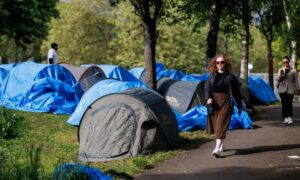
Ireland’s economy is “absolutely booming,” says Stephen O’Dwyer, the founder and owner of Dublin’s Tang cafe/restaurant chain. “But it has left people facing a very unequal and difficult society to work in.”
At the top of O’Dwyer’s concerns is housing, which is cited by businesses large and small as a significant barrier to Ireland’s economic growth. The capital is not alone: cities from Cork to Limerick report acute housing shortages and rising levels of homelessness.
“Housing is such a big issue – probably the No 1 issue businesses face at the moment,” he says. “For most people in the city, finding a job is the easy part. Finding a place to live is very difficult.”
In the run-up to this week’s European elections, which take place in Ireland on 7 June, the housing logjam has led to much soul-searching: how can the country hope to fully capitalise on its economic potential without giving people a place to live?
After a decade of low investment in all aspects of public infrastructure, when the only new properties being built were the single-dwelling homesteads that dot the countryside, Ireland is building again.
Yet construction work is consistently falling behind demand, held back by an exodus of building workers after the 2008 financial crash.
Business groups have urged the government to inject more urgency. Ministers say spades are going in the ground as quickly as industry can take on new work.
Meanwhile, projects to build data centres, rail connections and hospitals face delays while contractors fight among themselves for skilled workers and the government desperately tries to clear planning backlogs.
Emblematic of these difficulties is a €2.2bn children’s hospital due to open in Dublin this year, but only after many delays and a budget that has swollen to four times its original estimate in 2015.
